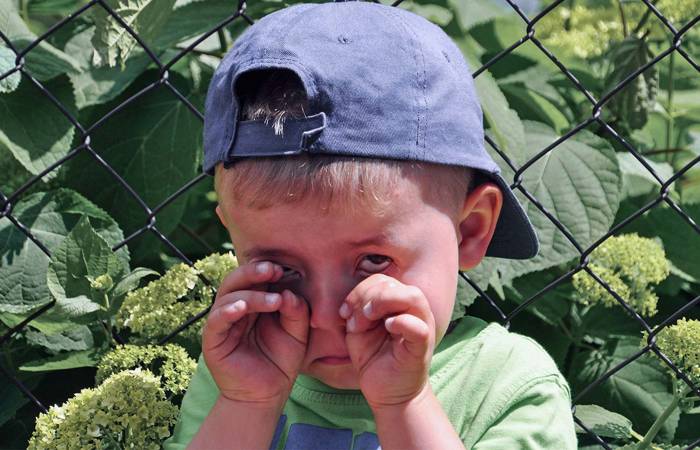Like what you see?
Sign up to receive more free parenting advice.
Thank you for subscribing to our newsletter!
Child Development

Credit: iStock.com/RainStar
Parents can easily feel frustrated or upset when their child lies to them.
‘Do they really think they can manipulate me?’
‘Not only do they do the wrong thing, but they also then lie to me.’
According to Dr Becky Kennedy, clinical psychologist behind the popular parenting Instagram page Dr Becky At Home, it all comes down to evolution and trust.
“Children will tell a lie every single time they think telling the truth will bring them really scary feelings of: my parents are so mad at me, my parents are punishing me, my parents are looking at me in a way that makes me feel unsafe, my parents are super disappointed in me, or I’m going to get in trouble,” says Dr Kennedy.
“Children aren’t trying to manipulate their parents to avoid getting in trouble, instead it goes back to an evolutionary mechanism of attachment.
“Staying close to parents ensures biological survival and psychological security – both necessary for a child to grow and thrive.
“From an evolutionary standpoint, our children need to feel safe with us which means that they need to feel that we want them around and that we love them.”
Why do children tell lies?
Dr Kennedy explains that if a child feels telling the truth will result in them feeling alone, shamed and fill their parents with any negative emotion, it isn’t that they will choose to lie, but rather that they will be compelled to lie to preserve the connection with their parents.
However, if a child believes that their parents will react to the truth with concern, inquiry and a belief that there is goodness underneath a bad behaviour, then they will be honest.
As the adult, you aren’t to blame for your child lying, but you are responsible for thinking about what is going on and you are responsible for taking the lead to create an environment where there can be more trust, so your child feels safe to share the truth.Dr Becky Kennedy
Stay up to date with the latest news and articles from First Five Years
Thank you for subscribing to our newsletter!
Punitive Vs non-punitive punishment
This is similar to what a 2011 study found.
Researchers compared a school that used punitive punishments and a school that used non-punitive punishments.
The students from the punitive school were more likely to lie, while those from the non-punitive school were significantly less likely to lie.
The study concluded that “a punitive environment not only fosters increased dishonesty but also children’s abilities to lie to conceal their transgressions”.
Messages of connection, love and understanding
Dr Kennedy recommends that for children to be honest with their parents, telling the truth must increase the connection and closeness between the parent and child.
“This is not to say that there can’t also be signs of disappointment or frustration from the parents about whatever behaviour the child did, but they need to be combined with messages of connection, love and understanding,” she adds.
If a child is lying, Dr Kennedy notes that the parent really needs to focus on what obstacles are preventing the child and parent from developing trust with each other.
“As the adult, you aren’t to blame for your child lying, but you are responsible for thinking about what is going on and you are responsible for taking the lead to create an environment where there can be more trust, so your child feels safe to share the truth.”
Dr Kennedy emphasises that the key in children lying is to be curious instead of judgemental.
“When we judge, we say: My child is lying. That is so bad.
“Whereas being curious sounds like: what is going in my child that would make them lie, what is a need my child has that is being expressed in this way, what is off between my child and I that lying seems like the best way for my child to get their need met instead of telling me the truth.”
Strategies for when children lie:
Rebuild the trust.
A child knocks over their sibling’s block tower but insists it wasn’t them. Instead of focusing on the behaviour and turning it into a power struggle, Dr Kennedy advises to set the stage for future truth telling.
“Instead of ‘I know you did it’, say, ‘Oh you didn’t knock it down, well, if someone did and I know it isn’t you, I guess something happened to make that child push their sibling’s tower down, I wonder what that child must have been feeling.
“If you find out who that child is, could you tell them that I won’t be upset, there won’t be a punishment, I just want to know what’s going on so that we can avoid that happening again.”
Listen to the complex feelings underneath the behaviour.
Dr Kennedy explains that children will tell the truth to their parents when they believe their parents are more interested in their internal experience than the external behaviour.
She gives the example of an older child hitting their younger sibling and lying about it.
“If a child gets punished and sent away, he learns his parents don’t care about what’s going on inside of him, they only care about what is on the outside, they don’t see him as a good child,” she says.
“Versus, the parent saying, ‘I will not let you hit, you must be upset about something, let’s figure it out’.
“That child is going to be less likely to lie as they’ve learnt that their parents see them as a good child, and they are willing to hear about the more complex feelings under the behaviour.”
Regulate their disappointment.
When a child struggles with understanding they can’t have something they want, it usually stems from disappointment. For example, when Mum says, “there is no iPad this afternoon” but they tell Dad that Mum said they could watch iPad, Dr Kennedy explains that it’s more about a child’s inability to regulate their disappointment, rather than tricking their parents.
“The lying happens to avoid the distress of wanting and not having,” she says.
“Instead of getting upset that they are trying to fool you, rather discuss with them that you understand they must find it hard to hear no, and that they must have been very disappointed.”
Connection seeking, not attention seeking.
A child who might lie in order to be the victim, for example, saying their sibling pushed them when they didn’t, might be wanting a deeper need met.
“Children might lie for connection seeking: ‘I need something and I’m not getting it, I don’t want to be seen as the bad child anymore and I want my sibling to be seen as the bad child and I’m the victim so I can get help’,” explains Dr Kennedy.







